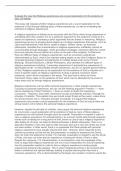Evaluate the view that Religious experiences are a sound explanation for the existence of
God. (30 marks)
This essay will evaluate whether religious experiences are a sound explanation for the
existence of God through defining types of these experiences, as well as evaluating key
criticisms of religious experiences.
A religious experience is defined as an encounter with the Divine which brings awareness of
something other than oneself. It is an a posteriori argument for the existence of God as it is
based on experience, contrasting a priori arguments that are based on reasoning. Religious
experiences are key to bringing about religion as it is these experiences that people, such as
Jesus and Muhammad, have had to create a religion. William James, an American
philosopher, identified four characteristics of religious experiences: ineffability (cannot be
communicated through language), noetic (provides knowledge), transience (lasts for a short
time) and passivity (occurs without any action on the part of the recipient). Furthermore,
there are different types of religious experiences, such as conversion experiences
(demonstrated by Saul), visions (for example seeing angels or any kind of religious figure) or
corporate blessings (happens simultaneously to multiple people such as the Toronto
Blessing). Richard Swinburne, a British Philosopher, also identifies five different types of
religious experiences including: 1) everyday experiences 2) extraordinary experiences 3)
describable private 4) indescribable private experiences, and 5) non specific general feeling
of God. Religious experiences as an explanation for the existence of God is inductive as it
looks at specific claims (a religious experience) to draw a general conclusion (God’s
existence), which will be evaluated in this essay. This also links to ethics as Divine
Command Theory relies on the existence of God, which can be attempted to be proven in
many ways such as through religious experiences.
Religious experiences can be either personal experiences or other peoples experiences.
Focusing on personal experiences, we can use the following argument: Premise 1 - I have
had an experience of God; Premise 2 - I have no reason to doubt this experience;
Conclusion - Therefore, God exists. Swinburne focuses and defends premise 2 through his
principle of credulity. This explains how we should accept things as they seem, unless there
are strong reasons not to. Using the principle of credulity, it is argued that religious
experiences can provide a sound explanation for the existence of God as long as there are
strong reasons not to believe this personal religious experience.
However, despite the principle of credulity, many argue that personal religious experiences
do not provide a sound explanation of the existence of God as many of these religious
experiences are self induced (brought about by oneself). Preparation is needed in order to
have a religious experience, for example being in an unusual mental state through prepared
events such as fasting for a long period of time, shown as Jesus had a religious experience
after fasting for 40 days. As stated by Bertrand Russell, a British philosopher, there is no
distinction between a man who eats too little and sees God and a man who drinks too much
and sees snakes. In other words, there is no guarantee that these people with personal
religious experiences have actually experienced God. However, Davis responds to this
criticism by pointing out that the fact that preparation is needed to experience the Divine,
does not mean the experience is false. For example, preparation is needed to see the whole
of Paris, this does not mean that the experience of seeing the whole of Paris is false.
Despite this response, V.S. Ramachandran, a neuroscientist, uses his knowledge of the
brain to argue that religious experiences are not a sound explanation for God by explaining
how the preparation needed in order to have a religious experience includes people
experiencing temporal lobe epilepsy. This is where heightened activity in the temporal lobe
leads to emotional and spiritual feelings, leading to people believing that they have a
numinous experience. This is demonstrated by Persinger who created a machine named the




